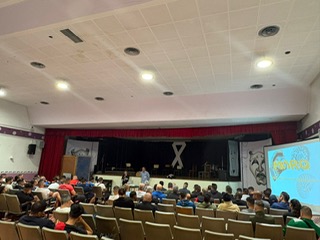
Back with a new story'. is the title of the programme that the MARQ is being held for the sixth consecutive year at the Foncalent prison in Alicante. The main objective of this initiative is to promote the accessibility of the group of men and women who are in prison to the knowledge of the history of the province through talks and workshops given by experts.
The Fundación CV MARQ has recently presented the programme to more than 90 male and female prisoners of the penitentiary centre. Both the managing director of the MARQ Foundation, Josep Albert CortésThe project has been developed in collaboration with the European Commission, as the coordinator of the Didactics, Accessibility and Social Responsibility Unit of the same, Gema Salaand the Didactics technician, Chema GalánThe objectives of the project were explained, as well as the contents of this new edition, the practical workshops and the timetable.
Returning with a new story' has the main objective of to bring the women and men in prison closer to the history of Alicante.using the material culture and the contents of the Archaeological Museum of the Provincial Council to turn the time of confinement into a stage in which to acquire new skills, experience, knowledge and ideas.
The project arose thanks to the collaboration agreement signed between the Fundación CV MARQ and the Foncalent penitentiary centre. The training sessions of this course will take place from November to MayThe fortnightly exhibitions will cover the history of Alicante from prehistoric times to the Contemporary Age, through the museum's own collections, monuments, such as The Almohad Tower of Almudaina and the Cava Gran in Agresor the sites of La Illeta in El Campello, Lucentum in Alicante, Petracos in Castell de Castells and the Cova de l'Or in Beniarrés. The workshops are given by specialised staff from the MARQ Foundation itself, as well as renowned guests related to history and culture. These training sessions will be complemented with didactic workshops related to the historical content received.
